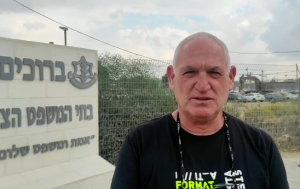For a list of posts about Honenu’s representation of the Levengrond-Yehezkel and Hajbi families in the Barkan terror attack case, please click here.
Monday, December 27, 2021, 15:47 In late December, an evidentiary hearing for the penalty of Abed al-Rahman Mazen Abada, who was convicted of failure to prevent the Barkan terror attack, was held at the Shomron Military Court in Salem. At the hearing, appraisals of the damage caused to the families of Ziv Hajbi, and Kim Levengrond-Yehezkel, Hy”d, were presented. Kim’s father, Rafi Levengrond, described the pain his family has endured and asked for the maximum penalty to be imposed on Abada, one of the abettors to the attack. Honenu Attorney Chayim Bleicher, who is representing the families as victims of terror, accompanied Levengrond to the hearing.
Rafi Levengrond spoke at the hearing: “The attack was carefully planned over four months. All of the abettors to the terrorist who took part in the attack must be prosecuted to the full extent of the law and the maximum penalty imposed on them. The attack was planned extremely well. The security forces had great difficulty apprehending the murderer, and it took them 70 days, although his identity was known from the first day.” Levengrond pointed at Abada and added, “This only shows that the abettors to the terrorist knew many details and knew what to do after the attack.”
“I lost everything that I had. Kai, Kim’s son, hardly knew and will not remember his mother. That is not a normal reality for a child. Therefore the court must impose the maximum penalty by law on him, although the maximum penalty is problematic; it’s still the minimum. It’s a slight penalty and does not truly reflect what the terrorist should pay.
“When imposing the penalty on him, the court must take into account that their [lenient] penalties make the State look like it does today. There is no deterrence, and we have an attack or an attempted attack on average every three days. Regarding monetary compensation, if any is imposed, I will demand a sum that the terrorist will actually pay, and not a number on a piece of paper. Maybe that will deter the next ones”
Honenu Attorney Chayim Bleicher: “Rafi came to the hearing to speak before the judges, to give a voice to the victims of terror and to the citizens of Israel, who feel the pain of terror and are demanding a decisive and genuine war on terror, at every level. I hope that the court will impose the maximum penalty on the abettor: five years’ imprisonment in addition to substantial compensation to the families of the victims. Every potential terrorist and every potential abettor must know that they will pay with years in prison and monetary compensation. The stiffer and the more painful the penalty is, the more the next abettor will think twice before assisting a terrorist.”
Abada was convicted of failure to prevent the Barkan terror attack. According to the bill of indictment, Abada was aware of Ashraf Walid Na’alwa’s intent to carry out a terror attack at the factory at which he worked. Approximately one month prior to the attack, Na’alwa shared his plan with Abada, including his intent to die as a martyr. Later, Na’alwa told Abada that he had succeeded in entering his place of work in the Barkan Industrial Park armed with a weapon that he had purchased, without being caught.
Na’alwa showed Abada the weapon, told him that he had prepared a will, spoke on the phone to an ammunition supplier while he was near Abada, and gave additional indications of his intent to carry out the attack. He also shared his escape plan with Abada – in the event that he did not die as a martyr – including the location of the cave in which he planned to hide, so that Abada could help him in case of need.
Abada and Na’alwa met every day for several days prior to the attack. They discussed Na’alwa’s will and other aspects of the plan. On the night before the attack, Na’alwa sent a message to Abada indicating that he was willing to explode himself. The following day Na’alwa carried out the attack.
Despite all of the opportunities that he had, the defendant (Abada) did not act in any reasonable way to prevent Ashraf’s act, which as stated caused the death of two Israeli citizens and the attempt to cause the death of an additional citizen.
Please click here for posts about Muhamed Ibrahim Kharsa, an abettor to the Barkan terrorist, and click here for a post about Abdallah Fouad Mustafa Mahmoud, another abettor.

